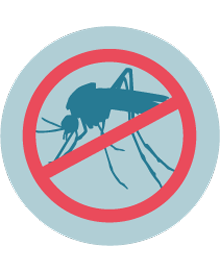Distributed via the CDC Health Alert Network
August 19, 2016, 1515 ET (3:15 PM ET)
CDCHAN-00394
CDC Expands Guidance for Travel and Testing of Pregnant Women, Women of Reproductive Age, and Their Partners for Zika Virus Infection Related to Mosquito-borne Zika Virus Transmission in Miami-Dade, Florida
Summary
CDC has previously issued travel, testing, and other guidance for local mosquito-borne Zika virus transmission (active Zika virus transmission) for a one-square-mile area in the Wynwood area of Miami that the Florida Department of Health (FL DOH) identified. The guidance for those who live in or traveled to this area any time after June 15, 2016, remains in effect.
FL DOH continues to investigate active Zika virus transmission in South Florida. Investigation has revealed a new area of active transmission in a 1.5-square-mile section of Miami Beach. In addition, FL DOH has identified multiple other individual instances of mosquito-borne Zika virus infection and an increase in travel-related cases.
Because the incubation period for Zika infection is up to two weeks, a high proportion of infected people have no symptoms, and the diagnosis and investigation of cases takes several weeks, coupled with these individual instances of mosquito-borne Zika virus infection and increase in travel-related cases, it is possible that other neighborhoods in Miami-Dade County have active Zika virus transmission that is not yet apparent.
For the identified area of active transmission in Miami Beach, CDC advises that the recommendations outlined below be followed. Based on the earliest time of symptom onset and a maximal two-week incubation period for Zika virus, this guidance applies to pregnant women, women of reproductive age, and their partners who live in or traveled to Miami Beach after July 14, 2016.
For all other areas of Miami-Dade County, while further investigations are underway, CDC advises strict adherence to precautions to prevent mosquito bites. Consistent with the August 3 recommendation of the Florida Governor, pregnant women in these areas should be assessed for potential exposure to Zika virus and, when indicated, obtain laboratory testing. Pregnant women and partners of pregnant women who are concerned about potential Zika virus exposure may also consider postponing nonessential travel to all parts of Miami-Dade County.
This is an ongoing investigation, and FL DOH and CDC are working together to rapidly learn more about the extent of active Zika virus transmission in Miami-Dade County. CDC will update these recommendations as more information becomes available.
Recommendations
- Pregnant women should avoid travel to the designated area of Miami Beach (http://www.cdc.gov/zika/intheus/florida-update.html), in addition to the designate)d area of Wynwood, both located in Miami-Dade County, because active Zika virus transmission has been confirmed in both of these areas.
- Pregnant women and their partners living in or traveling to the designated areas should be aware of active Zika virus transmission and should follow steps to prevent mosquito bites (http://www.cdc.gov/zika/prevention/prevent-mosquito-bites.html). Healthcare providers caring for pregnant women and their partners should visit CDC Zika website (http://www.cdc.gov/zika/) frequently for the most up-to-date recommendations.
- Women and men who live in or who have traveled to the designated area of Miami Beach since July 14, 2016, should be aware of active Zika virus transmission, and those who have a pregnant sex partner should consistently and correctly use condoms or other barriers to prevent infection during sex or not have sex for the duration of the pregnancy. The same recommendation applies for women and men who live in or who have traveled to the designated area in Wynwood since June 15, 2016.
- Pregnant women and partners of pregnant women who are concerned about potential Zika virus exposure may also consider postponing nonessential travel to all parts of Miami-Dade County.
- All pregnant women in the United States should be assessed for possible Zika virus exposure and signs or symptoms consistent with Zika virus disease at each prenatal care visit. Women with ongoing risk of possible Zika virus exposure include those who live in or frequently travel to the designated areas of Miami Beach and Wynwood due to the possibility of active Zika virus transmission. Women with limited risk of Zika virus exposure include those who traveled to the designated areas of Miami Beach and Wynwood or had sex without using condoms or other barrier methods to prevent infection by a partner who lives in or traveled to the designated areas of Miami Beach and Wynwood. Each prenatal evaluation should include an assessment of signs and symptoms of Zika virus disease (acute onset of fever, rash, arthralgia, conjunctivitis), travel history, and sexual exposure to determine whether Zika virus testing is indicated. Limitations of laboratory tests used to diagnose Zika virus infection should also be discussed with pregnant women and their partners.
- Pregnant women with possible exposure to Zika virus and signs or symptoms consistent with Zika virus disease should be tested for Zika virus infection based on time of evaluation relative to symptom onset in accordance with CDC guidance (http://www.cdc.gov/mmwr/volumes/65/wr/mm6529e1.htm?s_cid=mm6529e1_e).
- Pregnant women with ongoing risk of possible Zika virus exposure and who do not report symptoms of Zika virus disease should be tested in the first and second trimesters of pregnancy in accordance with CDC guidance (http://www.cdc.gov/mmwr/volumes/65/wr/mm6529e1.htm?s_cid=mm6529e1_e).
- Pregnant women with limited risk of possible Zika virus exposure and who do not report symptoms should consult with their healthcare providers to obtain testing for Zika virus infection based on the elapsed interval since their last possible exposure in accordance with CDC guidance (http://www.cdc.gov/mmwr/volumes/65/wr/mm6529e1.htm?s_cid=mm6529e1_e).
- Women with Zika virus disease should wait at least eight weeks after symptom onset to attempt conception, and men with Zika virus disease should wait at least six months after symptom onset.
- Women and men with ongoing risk of possible Zika virus exposure who do not have signs or symptoms consistent with Zika virus disease and are considering pregnancy should consult their healthcare provider. Due to the ongoing risk of possible Zika virus exposure, healthcare providers should discuss the risks of Zika, emphasize ways to prevent Zika virus infection, and provide information about safe and effective contraceptive methods. As part of their pregnancy planning and counseling with their healthcare providers, some women and their partners living either of the two designated areas (Miami Beach and Wynwood) might consider if now is the right time to get pregnant due to the possibility of exposure to Zika virus during pregnancy or the periconceptional period.
- Women and men with limited risk of possible Zika virus exposure and who do not report signs or symptoms consistent with Zika virus disease should wait at least eight weeks after last possible exposure to attempt conception.
Background
Zika is spread to people primarily through the bite of an infected Aedes species mosquito (Ae. aegypti and Ae. albopictus). Zika virus can also be sexually transmitted. Zika virus infection during pregnancy can cause microcephaly and severe fetal brain defects, and has been associated with other adverse pregnancy outcomes. Most persons infected with Zika virus will not have symptoms; infants with microcephaly and other birth defects have been born to women with Zika virus infection who do not report symptoms.
CDC’s testing recommendations for pregnant women are the same for those with ongoing and those with limited risk for possible Zika virus exposure who report clinical illness consistent with Zika virus disease (symptomatic pregnant women). Symptomatic pregnant women who are evaluated less than two weeks after symptom onset should receive serum and urine Zika virus rRT-PCR testing. Symptomatic pregnant women who are evaluated two to 12 weeks after symptom onset should first receive a Zika virus immunoglobulin (IgM) antibody test; if the IgM antibody test result is positive or equivocal (unclear), serum and urine rRT-PCR testing should be performed.
Testing recommendations for pregnant women with possible Zika virus exposure who do not report clinical illness consistent with Zika virus disease (asymptomatic pregnant women) differ based on the circumstances of possible exposure. For asymptomatic pregnant women with ongoing risk for possible exposure and who are evaluated less than two weeks after last possible exposure, rRT-PCR testing should be performed. If the rRT-PCR result is negative, a Zika virus IgM antibody test should be performed two to 12 weeks after the exposure. Asymptomatic pregnant with limited risk for possible exposure who are first evaluated two to 12 weeks after their last possible exposure should first receive a Zika virus IgM antibody test; if the IgM antibody test result is positive or equivocal (unclear), serum and urine rRT-PCR should be performed. Asymptomatic pregnant women with ongoing risk for possible exposure to Zika virus should receive Zika virus IgM antibody testing as part of routine obstetric care during the first and second trimesters; immediate rRT-PCR testing should be performed when IgM antibody test results are positive or equivocal (unclear).
Further information on the interpretation of laboratory test results and clinical management of pregnant women with laboratory evidence of possible Zika virus infection are available below.
For More Information
|





